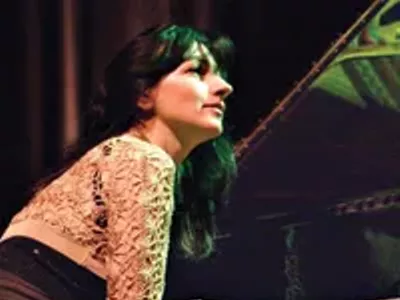Aguirre, the Wrath of God (1972)
Written and directed by Werner Herzog. Starring Klaus Kinski, Ruy Guerra, Helena Rojo, Peter Berling, Cecilia Rivera, Dan Ades, Alejandro Repulles, Edward Roland and Del Negro. Running time: 93 minutes. Not rated. In German with English subtitles.
The Mystery of Kaspar Hauser (1974)
Written and directed by Werner Herzog. Starring Bruno S, Walter Ladengast, Brigitte Mira, Volker Prechtel, Gloria Doer, Willy Semmelrogge and Hans Husaeus. Running time: 109 minutes. Not rated. In German with English subtitles.
The last few years have seen a resurgence of interest in Werner Herzog, the iconoclastic German filmmaker whose 40-plus films contain some of the most potent expressions of ruthless obsession, unswerving determination and precarious self-invention ever committed to celluloid. The famously soft-spoken Herzog, now 65, is known for his unvarnished opinions and adventurous nature; he's a truly independent filmmaker driven by a restless curiosity, without regard for box-office consequences.
Equally adept at features and documentaries, Herzog experienced a comeback with 2005's Grizzly Man and last summer's Rescue Dawn, his best-reviewed and attended films in decades. These English-language tales of survival — a documentary about a self-appointed protector of Alaskan bears and a feature chronicling an American pilot's escape from a Vietnamese POW camp — explore the same harrowing themes that have driven his work since the 1960s.
This weekend, the Detroit Film Theatre highlights two of the German films that made Herzog's reputation: Aguirre, the Wrath of God (1972) and The Mystery of Kaspar Hauser (1974). These period pieces are based on the lives of real people, but in typical Herzog fashion, emotional truth trumps restrictions of history. Portrayed by two of Herzog's favorite actors, Klaus Kinski and Bruno S, Don Lope de Aguirre and Kaspar Hauser are shaped by the ways they embrace — and reject — their assigned roles in society.
Aguirre, the Wrath of God was Herzog's first cinematic trip down the Amazon River, one that would greatly influence not only Apocalypse Now, but all subsequent films exploring colonialism's heart of darkness. Following a mutinous band of conquistadors led by the crazed, charismatic Kinski in 1560, Herzog shows the destructive arrogance of church and state — and how the dream of gold slowly eats away at the bonds of civilization.
Hypnotic and lucid, Aguirre is a fever dream grounded in brutal realism. The megalomaniacal Aguirre refuses to accept the futility of searching for El Dorado, and his delusion becomes everyone's undoing. As much as the volatile Kinski drives events (Herzog explores their tempestuous relationship in My Best Fiend), Aguirre is about how the doomed party responds to tyranny, as well as the grand crimes of men emboldened by perceived moral superiority.
While Aguirre is a puffed-up superman, Kaspar Hauser is nearly a nonentity, a grown-up "foundling" who mysteriously appears in a Nuremberg town square in 1828. Kept in a cellar most of his life, he can barely communicate or even walk, and has to acquire as an adult the knowledge and skills most people absorb as children. This makes him a freak show celebrity and guinea pig for the German intelligentsia half a century before the establishment of psychology.
Displaying a cool confidence, Herzog makes this Mystery less about uncovering Kaspar's origins than tracking his evolution from innocence to experience through the remarkable presence of the enigmatic Bruno S (for Schleinstein). A street performer, outsider artist and novice actor, Schleinstein was twice as old as the real Hauser, but this only adds to the poignancy of his performance, particularly the way he chafes under the expectations of well-intentioned benefactors who eagerly want to restore what's been "lost" during his confinement.
Herzog has a methodology that works from the outside in, first establishing the vibrancy of his locales (the wild Amazon basin, the genteel German countryside), then building characters by showing how they respond to their environments. He also appreciates the power of stillness, using long takes to draw out their interior lives. It's an approach that should serve him well in the new documentary Encounters at the End of the World (in theaters July), where he heads to the McMurdo Station in Antarctica to engage with wildlife and people living in extreme conditions.
The word "extreme" is often used when discussing Herzog, particularly after Burden of Dreams (1982) documented the behind-the-scenes insanity of another Amazon epic, the quixotic Fitzcarraldo. But what distinguishes Werner Herzog is that he's as much a doer as a dreamer, with thoughtfulness and discipline to channel his inspired madness. All of which makes him an excellent traveling companion, to the ends of the earth and beyond.
Showing at the Detroit Film Theatre (inside the DIA, 5200 Woodward Ave., Detroit; 313-833-3237), Aguirre, the Wrath of God at 7:30 p.m. Thursday, April 24, and 9:30 p.m. Friday, April 25; and The Mystery of Kaspar Hauser at 9:30 p.m. Saturday, April 26, and 1 p.m. Sunday, April 27.






